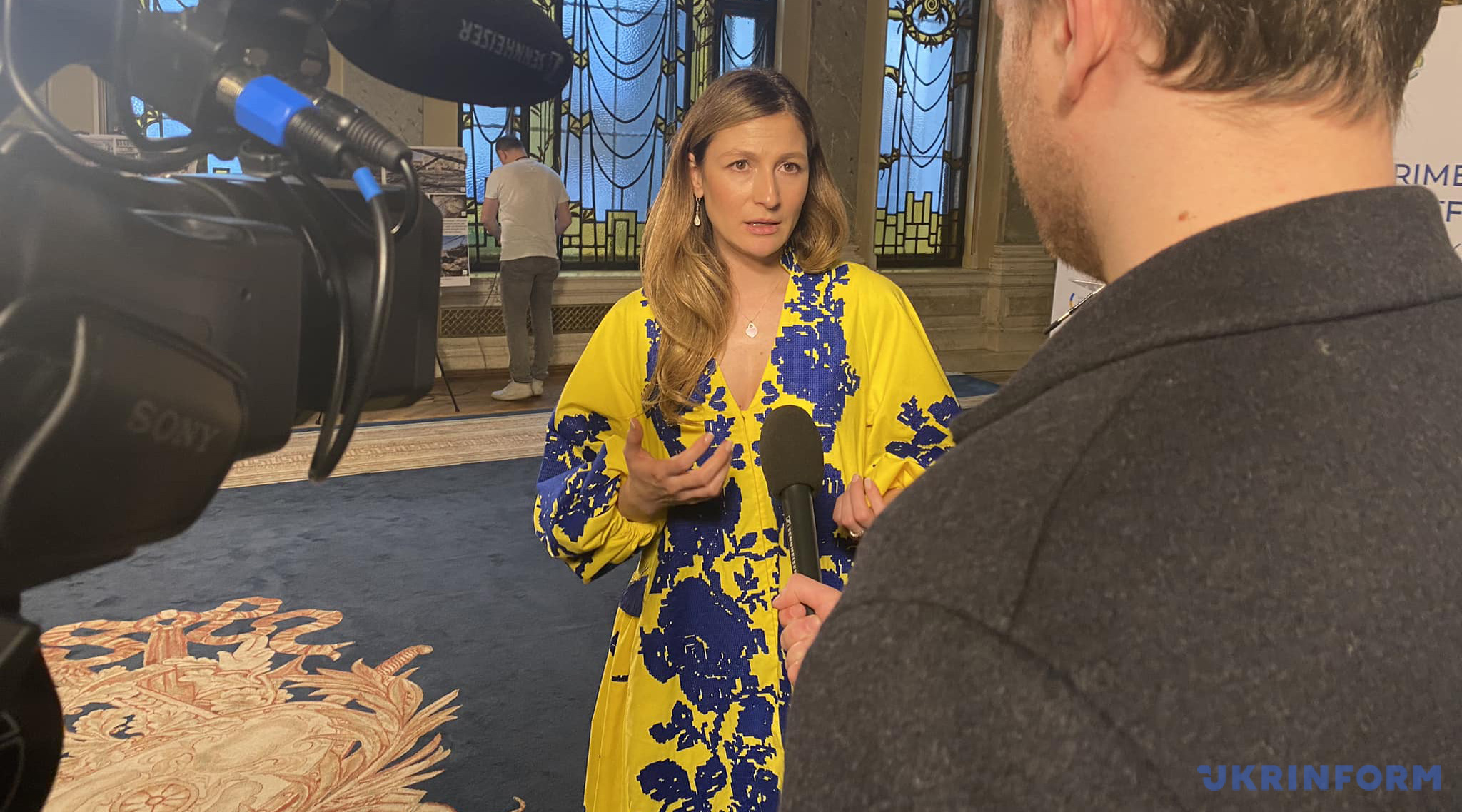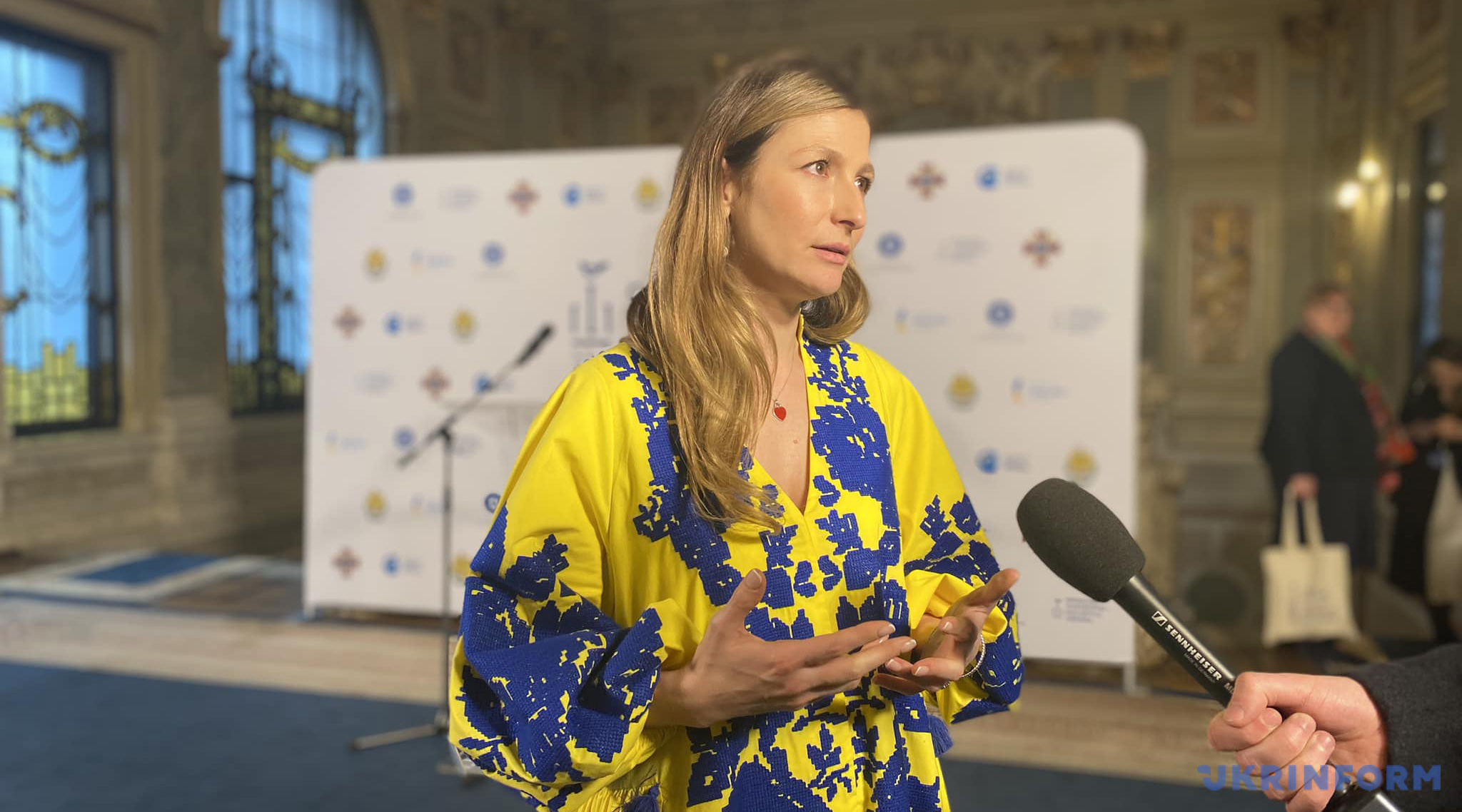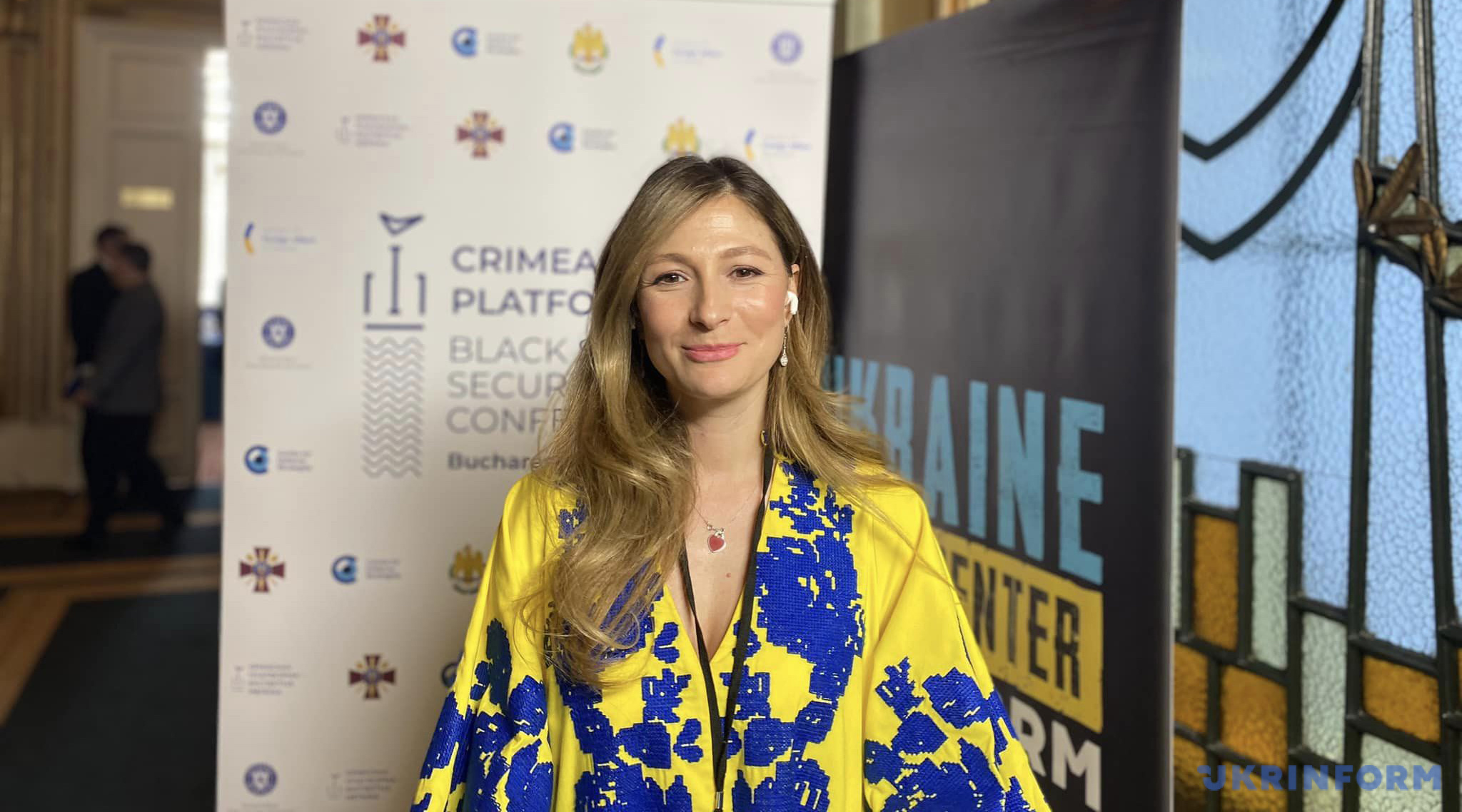The First Black Sea Security Conference, held in Bucharest on April 12-13, concluded the framework for the International Crimea Platform, which is a coordination mechanism for the de-occupation of the Crimean peninsula. The event, initiated by Ukraine and implemented in partnership with Romania, was attended by representatives from more than 50 countries and organizations. This demonstrates that not only the countries in the region but also the entire world is interested in restoring the security system in the Black Sea and the Sea of Azov which was destroyed by Russia's occupation of Crimea and subsequent aggression against Ukraine.
In the Romanian capital, Ukrinform had the opportunity to briefly speak with First Deputy Minister of Foreign Affairs of Ukraine Emine Dzhaparova about the Black Sea Security Conference, ways to de-occupy Crimea, and the prospects for a new regional alliance between Ukraine, Moldova, and Romania.
BLACK SEA SECURITY CONFERENCE SERVES AS PLATFORM FOR DEVELOPING STRATEGY FOR THE REGION.
- Can you provide an update on the status of the Strategy for the De-occupation and Reintegration of Crimea, and how does the Crimea Platform fit into it?
- The Strategy for the De-occupation and Reintegration of Crimea was developed before the launch of the Crimea Platform. One of the key outcomes of implementing the strategy was the establishment of the Crimea Platform which is an international coordination mechanism and informal platform. When we launched it, our goal was simple: to put Crimea back on the international agenda. And I think we have achieved that. However, now we face a new challenge as the Russian Federation continues its aggression.
The main lesson we have learned is the "Crimean lesson." In 2014, we, as a country and the world as a whole, were unable to prevent this evil from happening, and it spread. Despite all our diplomatic negotiations and attempts, especially by European leaders, to find a language that Putin would understand or a leader that he would listen to, Putin perceived these efforts as a sign of weakness and took the next step in his aggression on February 24. Therefore, this "Crimean lesson" is very important and is the focus of discussion at the Black Sea Security Conference.
It is worth noting that the Crimea Platform has several dimensions: parliamentary, governmental, leadership, and expert. We designed the Black Sea Security Conference to be a permanent, regular platform that specifically focuses on security challenges in the Black Sea and the Sea of Azov basins, which Russia has essentially turned into its inland lake. The aim is to make this platform practical and effective.
We all understand that today there is no clear vision or strategy on the part of either the EU or NATO countries, or players such as the UK, Japan, and the US. But there are attempts to formulate such a vision, and the goal of this platform is precisely to push and quickly formulate such a strategy and implement it in concrete steps.
What are these steps? There are many of them. Yesterday, experts developed a whole document that we will now take into account, and consultations will continue within this platform. For example, there is a proposal to conduct joint patrols to ensure the permanent presence of NATO countries in the Black Sea, to balance the dominance of the Russian Federation. Another crucial step is demining, as Ukraine is currently the most mine-contaminated country, both on land and water. That is why demining should be a major humanitarian effort of the international community. But there are also many other analytical and practical steps that we have begun to discuss.
The tasks are quite ambitious. In times of war, there may be limitations in terms of what we can implement. But it is clear that Ukraine should be a maritime power. Ukraine should assume this role in the future, especially after the Victory and having the most important thing - military expertise. We must not only advance diplomatically in the international arena but also increase our capabilities at sea as a maritime power and build a fleet accordingly.
However, this is a matter for the next steps. And I am convinced that the Black Sea Security Conference should become a platform where all the tasks can be crystallized.

UKRAINE IS CHAMPION IN SHAPING REALITY WITH ITS ENERGY
- Have you noticed any willingness on the part of the Black Sea countries and NATO in general to increase their presence in the region, especially in naval terms?
- We have noticed an increased interest, indicated by the level of participation and the number of countries present, which is more than 50. Our main message is that the lack of attention and vision before 2014, especially in the Black Sea, contributed to Russian aggression. The first panel discussed the lessons learned and the need to admit our mistakes, acknowledging that we were not able to stop the aggression and instead chose a language of reconciliation with the aggressor as we saw on February 24.
Therefore, speaking about the readiness of countries, I will say that there is already a first step - a high interest. And we now live in a world where you shape reality with your energy, your capacity. And Ukraine today is a champion in shaping this reality — something that could not have been imagined a year ago, when it was not obvious that we would survive, and when few believed that we would be able to hold on. Today, few people doubt that Ukraine will win.
The only way forward is to turn this spirit into concrete action, including Ukraine's victory, its development, greater subjectivity in the international arena, further international isolation of Russia, repentance of Russian society, compensation mechanisms for Russians, and much more.
UKRAINE—MOLDOVA—ROMANIA TRIANGLE AS NEW REGIONAL ALLIANCE
- On the sidelines of the conference, various bilateral meetings are also taking place, including a trilateral meeting between Ukraine, Romania, and Moldova. During these meetings, do you discuss the issue of the de-occupation of Crimea and the restoration of Ukraine's control over the peninsula, including by military means? What is the attitude of the partners towards this?
- First, this is a very important format — the triangle that we are implementing with Romania and Moldova. The first meeting within this triangle was initiated and held by Minister Dmytro Kuleba in Odesa last year, and it was a very successful format. This year, we have chosen security as the main focus and subject of attention, which is logical and natural within the framework of the Black Sea Security Conference.
The meeting between the leadership of the ministries of defense and foreign affairs of Ukraine, Moldova, and Romania will take place literally within the next hour. Everything is on the agenda: defense cooperation, political and diplomatic cooperation, EU and NATO issues, and European and transatlantic integration (Romania is very supportive of Moldova and Ukraine's aspiration to join the EU). This also includes energy and infrastructure cooperation. The next meeting that we want to hold within this triangle is planned to involve the ministers of energy and infrastructure.

That is, we believe that such regional alliances or regional cooperation are particularly effective when the multilateral system demonstrates its inability to cope with the challenges that arise. We see successful steps taken by the UN system and other international organizations, as well as steps that are not so successful.
Therefore, I would like to emphasize that we live in a time where the impossible has become possible. To achieve the impossible, our society as a whole, including our military, diplomats, government officials, volunteers, doctors, teachers, and women, are taking incredible steps forward. I believe that we are a great nation that the whole world admires today.
BOTH MILITARY AND DIPLOMATIC WAYS ARE RELEVANT FOR DE-OCCUPATION OF CRIMEA
- I would like to clarify the situation regarding the de-occupation of Crimea, including the possibility of using military means, and the reaction of our partners in this regard.
- In my opinion, our main victory in the issue of Crimea — and the Crimea Platform is a prerequisite for this — is that the world has recognized that Crimea is an integral and inalienable part of Ukraine. As we say: Crimea has been and will be Ukraine. The messages and signals that all countries are sending indicate that the fate of Crimea and the way of returning it should be determined by Ukraine itself. We have the support of our partners in this.
Therefore, it seems to me that today we have both options available: military and diplomatic. Both are relevant. For example, when there was a war in the 1990s, Croatia returned two-thirds of its territory militarily and one-third diplomatically.
As President Zelensky and the entire leadership of the country have emphasized, Crimea is an integral part of Ukraine. The minister also stated in his speech today that any voices suggesting that we should take one step at a time and return Crimea later are not true. Ukraine categorically rejects such opinions. Second, the return of Crimea will be determined by Ukraine itself. Given the ongoing war, this will likely involve both military and diplomatic efforts.

WE MAY BE SMALLER BUT WE ARE STRONG
- And could you provide more clarification on the Ukraine-Moldova-Romania triangle? How do you envision its future development? Is it possible to establish an institutional framework for this cooperation? What are the initial practical steps that you anticipate from this trilateral collaboration?
- At this point, it is premature to talk about institutionalizing this format. It remains informal, but we see its effectiveness.
In fact, trust is crucial in the world, and it is built through communication, contacts, meetings, and the genuine expression of each country's vision and position. It appears to me that there is trust among the three countries in this triangle.
I recently returned from a very active and intensive two-day visit to India, where I had a very important meeting with the ambassadors of the EU member states. I sincerely felt that I was among family.
I believe that the main achievement this year — when we proclaim to the world that we may be smaller but we are strong — is that we have been acknowledged as part of the European family and the security environment. Ukraine not only seeks to join the EU and NATO, but also intends to make significant contributions to the security of NATO countries, as well as to the economic, trade, energy, information, and digital capabilities of EU countries.
Therefore, regional alliance formats such as this will persist. Some, such as the Lublin Triangle or the Crimea Platform, are already more prominent. However, we will continue to unite around our objectives, and the format of such alliances will be determined later.
Vasyl Korotky, Bucharest
